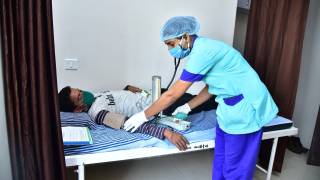Oral JAK Inhibitor Reduced Deaths Among COVID-19 Patients Receiving Invasive Mechanical Ventilation

Indiana-based Eli Lilly and Company and Delaware-based Incyte announced today results from an additional cohort of 101 adult patients from the COV-BARRIER clinical trial, focused on Olumiant (Baricitinib), a Janus kinase inhibitor.
Olumiant is a once-daily, oral JAK inhibitor approved in the U.S. and more than 70 countries to treat moderate to severe rheumatoid arthritis adults.
In this sub-study, patients with COVID-19 on mechanical ventilation or extracorporeal membrane oxygenation (ECMO) who received baricitinib plus standard of care were 46% less likely to die by Day 28 compared to patients who received placebo plus standard of care (nominal p-value=0.0296; hazard ratio [HR] [95% CI] = 0.54 [0.31, 0.96]; analysis not adjusted for multiplicity).
The cumulative proportion of patients who died by Day 28 was 39.2% in the baricitinib arm versus 58% in the placebo arm.
Similar mortality benefit was observed by Day 60 (HR [96% CI] = 0.56 [0.33, 0.97]) with a cumulative proportion of death of 45.1% for baricitinib compared to 62% for placebo.
These findings are consistent with the reduction in mortality observed in the overall COV-BARRIER patient population.
"As additional data from COV-BARRIER become available, it is increasingly evident that treatment with baricitinib may help prevent death in some of the most critically ill COVID-19 patients and that baricitinib represents an important treatment option for this vulnerable group of patients in this constantly evolving pandemic," stated E. Wesley Ely, M.D., M.P.H., professor of medicine and co-director of the Critical Illness, Brain Dysfunction, and Survivorship Center at Vanderbilt University Medical Center and co-principal investigator of COV-BARRIER, in a press statement issued on August 3, 2021.
By Day 28, the frequency of adverse events, serious adverse events, and serious infections were similar in the baricitinib group (88%, 50%, and 44%, respectively) compared to placebo (95.9%, 71.4%, and 53.1%, respectively).
However, venous thromboembolic events were reported in 6% of patients treated with baricitinib and 6.1% of patients treated with placebo. No new safety signals were identified.
"In the interest of public health and safety, it remains a priority to provide healthcare professionals with as much information as possible about treatment options that may help improve outcomes for patients with severe disease," added Ilya Yuffa, SVP, and president of Lilly Bio-Medicines.
"These new data add to the growing body of evidence demonstrating the important role baricitinib has and may continue to play for certain hospitalized patients with COVID-19."
According to the press release, Lilly intends to publish detailed results from this additional sub-study in a peer-reviewed journal and present the findings at a medical meeting in the coming months.
Recently, the U.S. FDA broadened the Emergency Use Authorization (EUA) for baricitinib on July 28, 2021, to allow for treatment with or without remdesivir. The EUA provides for the use of baricitinib to treat COVID-19 in hospitalized adults and pediatric patients two years of age or older requiring supplemental oxygen, non-invasive or invasive mechanical ventilation, or ECMO.
Baricitinib is an oral JAK inhibitor discovered by Incyte and licensed to Lilly.
Lilly is a global health care leader that unites caring with discovery to create medicines that make life better for people around the world.
Our Trust Standards: Medical Advisory Committee























